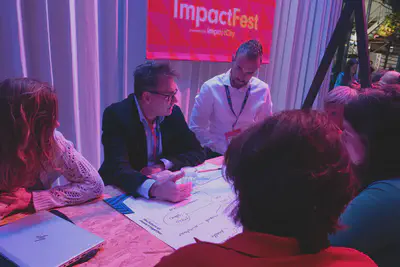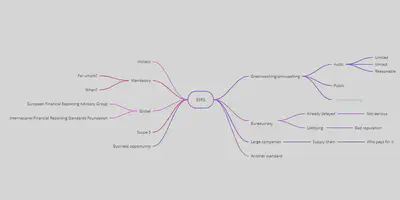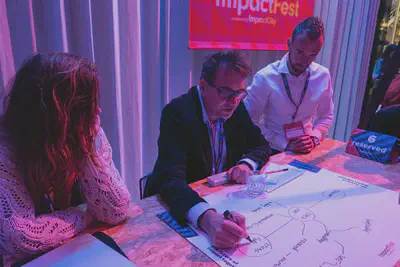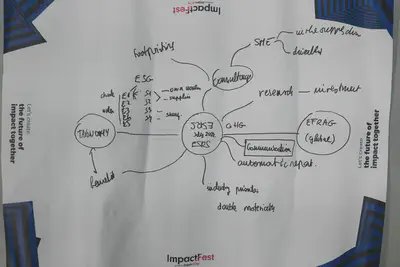ImpactFest Roundabout: ESRS Reporting Standards
Make sure that your metadata is in sync with the world

Daniel Antal, the co-founder of Reprex, moderated a roundabout with experts on the 8th ImpactFest about the problems around the introduction of the European Sustainability Reporting Standards (ESRS).
What is ImpactFest?
ImpactFest is the leading impact event. The eighth edition of ImpactFest took place in the Fokker Terminal in The Hague.
ESRS
The European Union’s revolutionary new integrated financial and sustainability reporting system will be introduced for about 4100 companies in the Netherlands and about 50,000 companies in the entire EU in 2024/25. Companies will have to connect the environmental and social impact measures of their economic activities with their financial accounting system and with the data system of their suppliers and buyers. In effect, they must be able to report on the whole lifecycle of a product or service.

Our Roundabout
Not revealing this mindmap above, the expert participants in the Roundabout engaged in a structured conversation, bringing questions and thoughts from their practice in sustainability consulting (with a social sustainability focus), university research (with a carbon focus) and application development for reporting.

The shared view on the introduction of ESRS and, generally, the Corporate Sustainability Reporting Directive (CSRD) was that even though just in the Netherlands more than 4000 companies are expected to apply these standards directly from the 2024 business year, and tens of thousands of SMEs in the supply chain will need to supply structured data, there is a very low level of understanding on the requirements. Companies hope that their accountant, auditor, or sustainability consultant will develop a magic tool that will be installed as a plug-in to their ERP system, and it will solve the problem.

Such a magic bullet that will hit all requirements with one shot, of course, does not exist. The aim of any ESG reporting is not to produce a report but to focus the management’s attention on reducing harmful impacts and increasing beneficial impacts on their stakeholders, users, and the broader environment they work in.
At the end of the conversation, we were making educated guesses about how various corporate leaders, including CFOs and heads of HR, will be involved in the process.
Reprex is developing an intelligent, semantic model to connect data in the financial bookkeeping of companies with reliable scientific benchmarks and data sources for benchmarking and target setting and with harmonised survey data for the supply chain data. Our OpenProduction tool prepares such data integration in film and music production. It utilises various OSSH (open source software and hardware) solutions to provide necessary upgrades for ERP systems or to support suppliers to produce information for their corporate buyers, donors for banks and insurance companies in a trustworthy and cost-effective way.